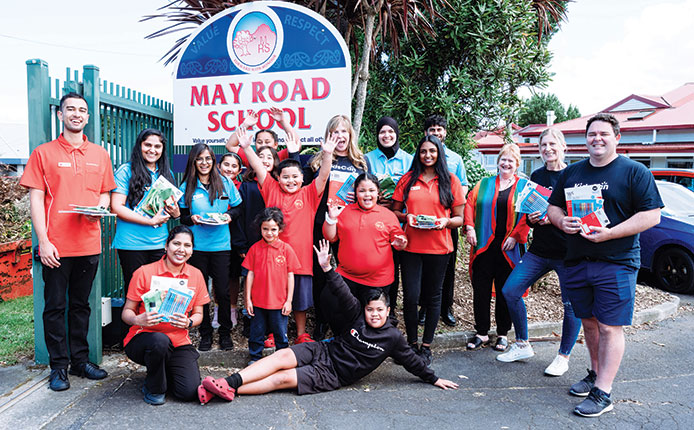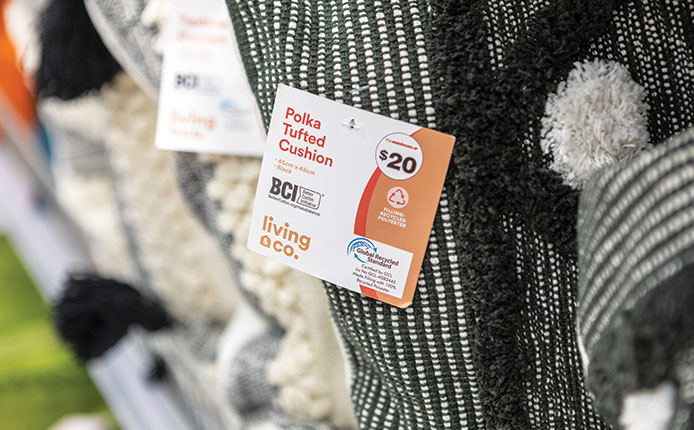OUR
RELATIONSHIPS
Te Ara Whanaungatanga



Guided by our purpose of helping Kiwis live better every day, The Warehouse Group has been able to continue to support our communities with more than $4.1 million raised for New Zealand charities and community groups this year, bringing the total raised to date to $83.4 million across the Group since 1982.
Guided by our purpose of helping Kiwis live better every day, The Warehouse Group has been able to continue to support our communities with more than $4.1 million raised for New Zealand charities and community groups this year, bringing the total raised to date to $83.4 million across the Group since 1982.
At a national level our key charity partners include Sustainable Coastlines, Youthline, Women’s Refuge, Variety – the Children’s Charity, The Salvation Army, Parenting Place, Whānau Āwhina Plunket, The Period Place, Hillary Outdoors and Life Education Trust. Over the course of FY23 we have also supported many more charities, including KidsCan during our The Warehouse and Warehouse Stationery Back to School campaign, the Kindness Collective for The Warehouse’s annual Mega Toy Sale and Orange Sky Aotearoa when we celebrated 50 years of Noel Leeming.
The generosity of our customers and teams was felt during the extreme weather events including Cyclone Gabrielle in early 2023, with $251,680 raised by our The Warehouse, Warehouse Stationery, Noel Leeming and Torpedo7 customers. A further $200,000 was donated by The Warehouse Group, bringing the total to $451,680 shared between community groups including The Hawke’s Bay Foundation, SuperGrans Tairāwhiti Gisborne, The Northland Foundation, ButtaBean Motivation, The Middlemore OUR RELATIONSHIPS Te Ara Whanaungatanga Foundation, Te Hā Oranga and The Salvation Army foodbanks.
More information about our work with national and local community groups and organisations can be found on pages 26 and 27.
The Warehouse Group Business (TWGB) has been working with organisations across New Zealand to source and supply products and services to multiple commercial sectors since 2019. Our agile ways of working means that we’re well positioned to be more responsive to customer needs and ensure we are delivering customer-centred outcomes. This new way of working will also help improve our business-tobusiness (B2B) platforms and ensure we’re future-ready. This will enable us to turn up as a ‘one-stop-shop’ supplier, leveraging our extensive supply chain to deliver complete solutions for our B2B customers across a variety of settings including accommodation, education facilities, and office environments.
In June 2023, TWGB hosted an event in Wellington to showcase the extensive range of products and services available to our government and commercial customers and show how we can support them with their sustainability goals through our commitment to sustainability and ethical sourcing practices. Not only did we demonstrate how our brands come together in a physical space, but we were able to share our knowledge and challenges on our mission to be New Zealand’s most sustainable B2B supplier. In particular, we demonstrated how we can support government customers with procurement through our recent inclusion on the Government Property Group Workplace and Classroom Furniture contract.
During the Hawke’s Bay relief response, the TWGB team partnered with key government agencies to provide emergency supplies for affected families. Within 24 hours, we delivered 27 pallets of products to families most in need including bedding, towels, toys, and other essential supplies. TWGB continues to partner with humanitarian and government agencies to provide ongoing accommodation fit-out support for families displaced in Auckland and the Hawke’s Bay. These fit-out solutions include beds, dining and living room furniture, and soft furnishings, with a full delivery and installation service so families can walk right into a furnished home.

Ethical sourcing
The Warehouse Group has had a comprehensive ethical sourcing programme for almost 20 years, primarily focused on private label products in The Warehouse, Warehouse Stationery and Torpedo7, to give our customers confidence that our products have been ethically sourced, and trust that we are maintaining sound labour and environmental standards throughout our supply chain.
Ethical sourcing
The Warehouse Group has had a comprehensive ethical sourcing programme for almost 20 years, primarily focused on private label products in The Warehouse, Warehouse Stationery and Torpedo7, to give our customers confidence that our products have been ethically sourced, and trust that we are maintaining sound labour and environmental standards throughout our supply chain.
This programme is underpinned by our Ethical Sourcing Policy. This policy outlines our requirements in eleven dimensions: Management Systems, Child Labour, Voluntary (Forced) Labour, Health and Safety, Wages and Benefits, Working Hours, Freedom of Association and Collective Bargaining, Environment, Subcontracting and Business Integrity, and has recently been expanded to include supplier responsibilities for Greenhouse Gas Management.
In FY23, The Warehouse Group’s private label products were sourced from around 680 factories primarily located in China, New Zealand, Australia, Bangladesh, USA, India, Vietnam, Thailand, Malaysia and the United Kingdom, involving about 300,000 workers.
Our private label factories must undergo ethical, labour and environmental assessments before entering our supply chain. In FY23, 184 new factories qualified to enter our supply chain via the recognition of existing third-party credentials, validated self-assessments or independent third-party labour and environmental audits. In addition to all-important labour rights, these assessments include a review of our suppliers’ actions to monitor wastewater discharge, control air pollutants, dispose of solid waste, enable recycling, and deal with any hazardous waste. In FY23, we conducted 266 labour and environmental third party onsite audits and maintained internal continuous improvement oversight, working actively with 296 factories in the year to assist them achieve compliance with our standards and local regulations.
Out of our 680 active private label factories, we found that 20 factories (2.9% of private label factories) had actual or potential negative social impacts which they failed to address, resulting in us ceasing trading with them. Decisions to terminate relationships with suppliers are not taken lightly. The 20 factories we ceased trading with consistently failed to participate transparently during assessments or did not meet the baseline criteria set by our Ethical Sourcing Policy.
The primary issue we identified during on-site assessments was a lack of transparency. This was evident in 42 factories (15.8% of those audited this year). Another common actual or potential negative social impact we observed was maintaining legal limits on working hours and compensation.
These findings emphasised the need for ongoing monitoring and remedial action, which we always require.
Our commitment remains firm: to ensure that every partner in our supply chain operates with the highest ethical and social standards.
Overall assessment scores averaged 88% with a 90% average for environmental factors, 94% average for health and safety factors, and 96% average for employment policies including child labour.1
Engaging suppliers
Our programme at Tier 1 (final manufacture) factory level is relatively mature. We traced our orders to 680 Tier 1 factories, and we estimate these represent 93% of private label product orders. This year we also traced and qualified 32 Tier 2 factories (raw material and component suppliers to our Tier 1 factories), relying on their existing third-party credentials, selfassessments with supporting evidence, and a smaller number of on-site assessments conducted by our own specialists.
Training remains a critical part of our engagement with suppliers. To help our factories achieve The Warehouse Group’s ethical sourcing expectations and develop new capabilities such as carbon management, or the use of more sustainable materials and packaging, suppliers participated in 354 on-site or virtual training sessions and completed 1,175 e-learning lessons on various labour, environment and greenhouse gas management topics.
In Bangladesh we and our suppliers continue to co-fund programmes under the Reimaging Industry to Support Equality (RISE) initiative which supports collaborative industry action to advance gender equality in global garment, footwear and home textiles supply chains. Two new factories joined us in this work over the past year in addition to the two factories whose programmes reached completion.
Our supplier scorecard guides our sourcing decisions and supplier selection, and looks at labour and environmental audit outcomes, alongside commercial performance measures. Going forward we intend to include a representation of supplier’s baseline greenhouse gas measurement (GHG), and the presence of Science Based Target initiative (SBTi) targets.
Our 2023 Ethical Sourcing Report with full details of our programme will be released in October 2023.
We have begun engaging our suppliers on the topic of GHG Management as part of our programme to reduce (Scope 3) emissions within our supply chain.

Our relationship with our shareholders is critical to our success as a key provider of capital and owners of the business.
We engage with our shareholders through regular investor meetings, the release of our interim and annual reports, our annual shareholders’ meeting, governance roadshows, and through market updates via the New Zealand Exchange in accordance with the principles of continuous disclosure.
Our relationship with our shareholders is critical to our success as a key provider of capital and owners of the business.
We engage with our shareholders through regular investor meetings, the release of our interim and annual reports, our annual shareholders’ meeting, governance roadshows, and through market updates via the New Zealand Exchange in accordance with the principles of continuous disclosure. We welcome all individual and group meetings with a variety of investor groups to gain further insights into what is most important to them. We are committed to transparent reporting of both financial and non-financial objectives. To report against all these objectives, targets and measurements, we report under Integrated Reporting and Global Reporting Initiatives (GRI).
This is our fifth Integrated Report through which we inform all stakeholders of our full retail value creation process – delivering key outcomes through six capital inputs from our networks, our customers, our relationships, our people, our financial capital and our environment. Refer to pages 28 and 29 for full details.
This is the third year we have reported under GRI as our sustainability reporting framework. We have maintained the view of our material topics which are most important to our shareholders and other stakeholders and have reported on the relevant GRI standards which are applicable to these material topics. Refer to pages 60 and 61 for the GRI Report and pages 110-113 for the GRI Content Index.
In December 2022, the New Zealand External Reporting Board (XRB) released the Aotearoa New Zealand Climate Standards (NZCS) for mandatory application for annual reporting periods beginning on or after 1 January 2023. We have already made progress in preparing for these disclosures including being a leader in the development of New Zealand retail sector scenario analysis for the Strategy section of this framework. These scenarios will be used to identify climate-related risks and opportunities and develop our transition plan to a 1.5-degree world. The New Zealand retail sector scenario public report was released on 19 September 2023 and can be found here.
We are on the pathway to report under the Aotearoa New Zealand Climate Standards in FY24.